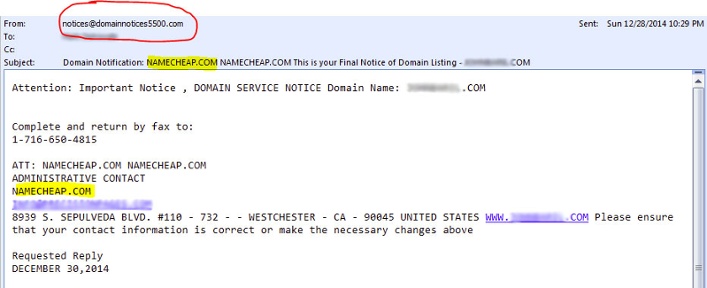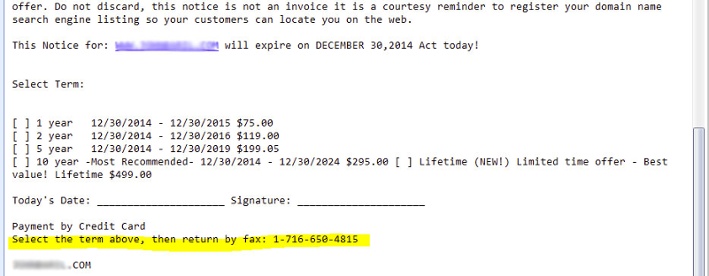It pays to read your email: a recent scam preys on business owners by urgently reminding them to renew their “domain name search engine registration” using language that feels like a domain renewal notice…
It pays to read your email. A recent scam preys on business owners by urgently reminding them to renew their “domain name search engine registration” using language that feels like a domain renewal notice. But, similar to the approach taken by unscrupulous snail mail spammers covered in our domain slamming post, this email is really nothing more than an attempt to sell you something vague at inflated prices.
How to Spot Scammy, Spammy Email
- Look at the sender’s address.
Does the sender’s domain match your current registrar’s domain? In this example, the email is coming from “notices@domainnotices5500.com”. Never heard of them? This should raise a red flag. Note: they’ve included our legitimate domain registrar (highlighted) in the subject line and body, but this is a distraction tactic. - Look for “Solicitation” or “Not a Bill” language.
These terms are a meager attempt at legitimizing a deceptive email. If you find anything like this, chances are very high that you’re being hustled. Delete the email and move on.In our example, the sender buries the truth of their offer in a sea of boilerplate. Don’t fall for the “reply to be removed” line either. This only confirms your email is good. You’ll likely get more, not less SPAM after “opting out”. - Does it pass the common sense test?
Does the email ask you to pay an unusually high amount? Or are you required to provide information that your domain registrar already has?This email asks us to pay a $75/year for “domain name search engine registration”. Don’t know what that is? Neither do we. But it’s presented in a way that feels an awful lot like your domain is going to expire, with the use of words like “final notice”, “expiration”, “domain listing” and “registration”.Additionally, this offer invites you to print out the email, fill in your credit card number and fax it back! When was the last time you bought something via fax?!
What to Do When You Doubt an Offer’s Authenticity
The next time you receive an email that smells “phishy”, don’t bite. If you spot an odd sender’s email address, find “solicitation” or “not a bill” language, or are asked to do something that doesn’t pass the common sense test, delete the message. If you spot grammar problems and misspellings, proceed with caution.
Don’t bother unsubscribing, don’t click on any links, simply delete it. If you have genuine concern, go directly to the website of your provider for the related service. In our case, we visited our domain registrar and found nothing out of the ordinary; no services set to expire.



